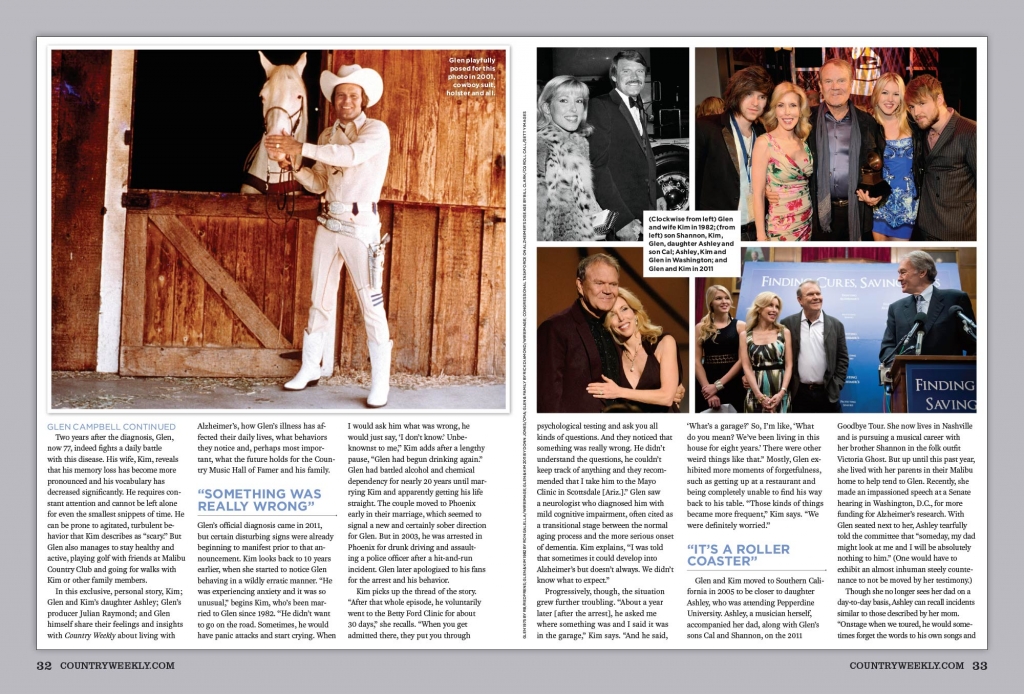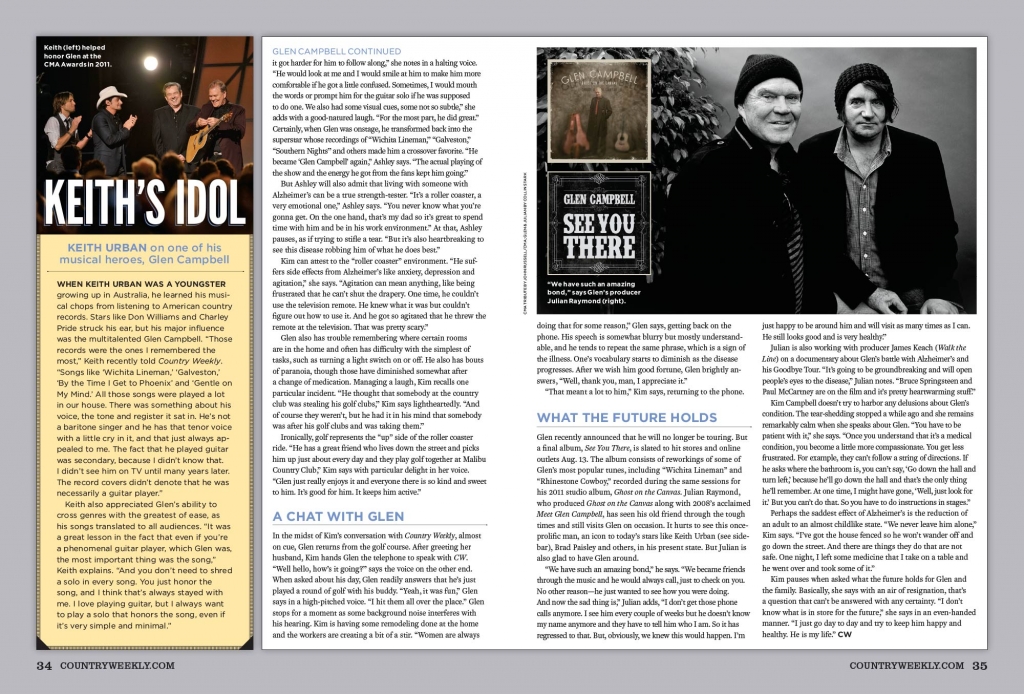Originally published in the June 24, 2013 issue of Country Weekly magazine.
Two years ago, Glen Campbell came forward with a powerful, completely candid announcement that rippled throughout the entertainment world. With wife Kim by his side, Glen revealed that he had been diagnosed with Alzheimer’s disease, the most common form of dementia, which eventually robs one of memory. It’s an unpredictable illness of which there is no known cure, a frightening prospect for anyone, much less a renowned and influential entertainer of Glen’s magnitude. But the family decided to make the announcement because they planned for Glen to embark on a series of farewell concerts, billed as the Glen Campbell Goodbye Tour, which kicked off later in 2011. Glen was also preparing to release a new album, Ghost on the Canvas, in August. They simply wanted the public to know that Glen was ill and might not be making music in the foreseeable future.
Two years after the diagnosis, Glen, now 77, indeed fights a daily battle with this disease. His wife, Kim, reveals that his memory loss has become more pronounced and his vocabulary has decreased significantly. He requires constant attention and cannot be left alone for even the smallest snippets of time. He can be prone to agitated, turbulent behavior that Kim describes as “scary.” But Glen also manages to stay healthy and active, playing golf with friends at Malibu Country Club and going for walks with Kim or other family members.
In this exclusive, personal story, Kim; Glen and Kim’s daughter Ashley; Glen’s producer Julian Raymond; and Glen himself share their feelings and insights with Country Weekly about living with Alzheimer’s, how Glen’s illness has affected their daily lives, what behaviors they notice and, perhaps most important, what the future holds for the Country Music Hall of Famer and his family.
“Something was really wrong”
Glen’s official diagnosis came in 2011, but certain disturbing signs were already beginning to manifest prior to that announcement. Kim looks back to 10 years earlier, when she started to notice Glen behaving in a wildly erratic manner. “He was experiencing anxiety and it was so unusual,” begins Kim, who’s been married to Glen since 1982. “He didn’t want to go on the road. Sometimes, he would have panic attacks and start crying. When I would ask him what was wrong, he would just say, ‘I don’t know.’ Unbeknownst to me,” Kim adds after a lengthy pause, “Glen had begun drinking again.” Glen had battled alcohol and chemical dependency for nearly 20 years until marrying Kim and apparently getting his life straight. The couple moved to Phoenix early in their marriage, which seemed to signal a new and certainly sober direction for Glen. But in 2003, he was arrested in Phoenix for drunk driving and assaulting a police officer after a hit-and-run incident. Glen later apologized to his fans for the arrest and his behavior.
Kim picks up the thread of the story. “After that whole episode, he voluntarily went to the Betty Ford Clinic for about 30 days,” she recalls. “When you get admitted there, they put you through psychological testing and ask you all kinds of questions. And they noticed that something was really wrong. He didn’t understand the questions, he couldn’t keep track of anything and they recommended that I take him to the Mayo Clinic in Scottsdale [Ariz.].” Glen saw a neurologist who diagnosed him with mild cognitive impairment, often cited as a transitional stage between the normal aging process and the more serious onset of dementia. Kim explains, “I was told that sometimes it could develop into Alzheimer’s but doesn’t always. We didn’t know what to expect.”
Progressively, though, the situation grew further troubling. “About a year later [after the arrest], he asked me where something was and I said it was in the garage,” Kim says. “And he said, ‘What’s a garage?’ So, I’m like, ‘What do you mean? We’ve been living in this house for eight years.’ There were other weird things like that.” Mostly, Glen exhibited more moments of forgetfulness, such as getting up at a restaurant and being completely unable to find his way back to his table. “Those kinds of things became more frequent,” Kim says. “We were definitely worried.”
“It’s a roller coaster”
Glen and Kim moved to Southern California in 2005 to be closer to daughter Ashley, who was attending Pepperdine University. Ashley, a musician herself, accompanied her dad, along with Glen’s sons Cal and Shannon, on the 2011Goodbye Tour. She now lives in Nashville and is pursuing a musical career with her brother Shannon in the folk outfit Victoria Ghost. But up until this past year, she lived with her parents in their Malibu home to help tend to Glen. Recently, she made an impassioned speech at a Senate hearing in Washington, D.C., for more funding for Alzheimer’s research. With Glen seated next to her, Ashley tearfully told the committee that “someday, my dad might look at me and I will be absolutely nothing to him.” (One would have to exhibit an almost inhuman steely countenance to not be moved by her testimony.)
Though she no longer sees her dad on a day-to-day basis, Ashley can recall incidents similar to those described by her mom. “Onstage when we toured, he would sometimes forget the words to his own songs and it got harder for him to follow along,” she notes in a halting voice. “He would look at me and I would smile at him to make him more comfortable if he got a little confused. Sometimes, I would mouth the words or prompt him for the guitar solo if he was supposed to do one. We also had some visual cues, some not so subtle,” she adds with a good-natured laugh. “For the most part, he did great.” Certainly, when Glen was onstage, he transformed back into the superstar whose recordings of “Wichita Lineman,” “Galveston,” “Southern Nights” and others made him a crossover favorite. “He became ‘Glen Campbell’ again,” Ashley says. “The actual playing of the show and the energy he got from the fans kept him going.”
But Ashley will also admit that living with someone with Alzheimer’s can be a true strength-tester. “It’s a roller coaster, a very emotional one,” Ashley says. “You never know what you’re gonna get. On the one hand, that’s my dad so it’s great to spend time with him and be in his work environment.” At that, Ashley pauses, as if trying to stifle a tear. “But it’s also heartbreaking to see this disease robbing him of what he does best.”
Kim can attest to the “roller coaster” environment. “He suffers side effects from Alzheimer’s like anxiety, depression and agitation,” she says. “Agitation can mean anything, like being frustrated that he can’t shut the drapery. One time, he couldn’t use the television remote. He knew what it was but couldn’t figure out how to use it. And he got so agitated that he threw the remote at the television. That was pretty scary.”
Glen also has trouble remembering where certain rooms are in the home and often has difficulty with the simplest of tasks, such as turning a light switch on or off. He also has bouts of paranoia, though those have diminished somewhat after a change of medication. Managing a laugh, Kim recalls one particular incident. “He thought that somebody at the country club was stealing his golf clubs,” Kim says lightheartedly. “And of course they weren’t, but he had it in his mind that somebody was after his golf clubs and was taking them.”
Ironically, golf represents the “up” side of the roller coaster ride. “He has a great friend who lives down the street and picks him up just about every day and they play golf together at Malibu Country Club,” Kim says with particular delight in her voice. “Glen just really enjoys it and everyone there is so kind and sweet to him. It’s good for him. It keeps him active.”
A Chat with Glen
In the midst of Kim’s conversation with Country Weekly, almost on cue, Glen returns from the golf course. After greeting her husband, Kim hands Glen the telephone to speak with CW. “Well hello, how’s it going?” says the voice on the other end. When asked about his day, Glen readily answers that he’s just played a round of golf with his buddy. “Yeah, it was fun,” Glen says in a high-pitched voice. “I hit them all over the place.” Glen stops for a moment as some background noise interferes with his hearing. Kim is having some remodeling done at the home and the workers are creating a bit of a stir. “Women are always doing that for some reason,” Glen says, getting back on the phone. His speech is somewhat blurry but mostly understandable, and he tends to repeat the same phrase, which is a sign of the illness. One’s vocabulary starts to diminish as the disease progresses. After we wish him good fortune, Glen brightly answers, “Well, thank you, man, I appreciate it.”
“That meant a lot to him,” Kim says, returning to the phone.
What the Future Holds
Glen recently announced that he will no longer be touring. But a final album, See You There, is slated to hit stores and online outlets Aug. 13. The album consists of reworkings of some of Glen’s most popular tunes, including “Wichita Lineman” and “Rhinestone Cowboy,” recorded during the same sessions for his 2011 studio album, Ghost on the Canvas. Julian Raymond, who produced Ghost on the Canvas along with 2008’s acclaimed Meet Glen Campbell, has seen his old friend through the tough times and still visits Glen on occasion. It hurts to see this once-prolific man, an icon to today’s stars like Keith Urban (see sidebar), Brad Paisley and others, in his present state. But Julian is also glad to have Glen around.
“We have such an amazing bond,” he says. “We became friends through the music and he would always call, just to check on you. No other reason—he just wanted to see how you were doing.
And now the sad thing is,” Julian adds, “I don’t get those phone calls anymore. I see him every couple of weeks but he doesn’t know my name anymore and they have to tell him who I am. So it has regressed to that. But, obviously, we knew this would happen. I’m just happy to be around him and will visit as many times as I can. He still looks good and is very healthy.”
Julian is also working with producer James Keach (Walk the Line) on a documentary about Glen’s battle with Alzheimer’s and his Goodbye Tour. “It’s going to be groundbreaking and will open people’s eyes to the disease,” Julian notes. “Bruce Springsteen and Paul McCartney are on the film and it’s pretty heartwarming stuff.”
Kim Campbell doesn’t try to harbor any delusions about Glen’s condition. The tear-shedding stopped a while ago and she remains remarkably calm when she speaks about Glen. “You have to be patient with it,” she says. “Once you understand that it’s a medical condition, you become a little more compassionate. You get less frustrated. For example, they can’t follow a string of directions. If he asks where the bathroom is, you can’t say, ‘Go down the hall and turn left,’ because he’ll go down the hall and that’s the only thing he’ll remember. At one time, I might have gone, ‘Well, just look for it.’ But you can’t do that. So you have to do instructions in stages.”
Perhaps the saddest effect of Alzheimer’s is the reduction of an adult to an almost childlike state. “We never leave him alone,” Kim says. “I’ve got the house fenced so he won’t wander off and go down the street. And there are things they do that are not safe. One night, I left some medicine that I take on a table and he went over and took some of it.”
Kim pauses when asked what the future holds for Glen and the family. Basically, she says with an air of resignation, that’s a question that can’t be answered with any certainty. “I don’t know what is in store for the future,” she says in an even-handed manner. “I just go day to day and try to keep him happy and healthy. He is my life.” CW









